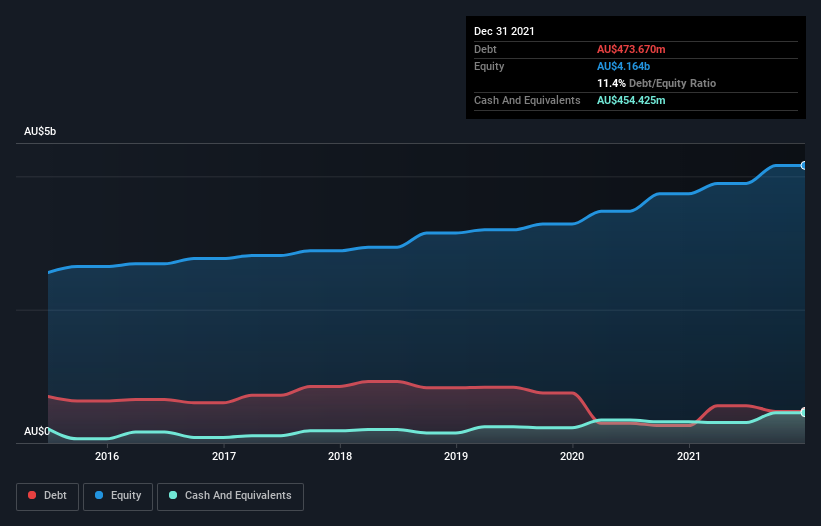These 4 Measures Indicate That Harvey Norman Holdings (ASX:HVN) Is Using Debt Reasonably Well

Warren Buffett famously said, 'Volatility is far from synonymous with risk.' So it might be obvious that you need to consider debt, when you think about how risky any given stock is, because too much debt can sink a company. Importantly, Harvey Norman Holdings Limited (ASX:HVN) does carry debt. But the real question is whether this debt is making the company risky.
When Is Debt A Problem?
Debt and other liabilities become risky for a business when it cannot easily fulfill those obligations, either with free cash flow or by raising capital at an attractive price. Part and parcel of capitalism is the process of 'creative destruction' where failed businesses are mercilessly liquidated by their bankers. While that is not too common, we often do see indebted companies permanently diluting shareholders because lenders force them to raise capital at a distressed price. Of course, plenty of companies use debt to fund growth, without any negative consequences. When we examine debt levels, we first consider both cash and debt levels, together.
Check out our latest analysis for Harvey Norman Holdings
What Is Harvey Norman Holdings's Net Debt?
As you can see below, at the end of December 2021, Harvey Norman Holdings had AU$473.7m of debt, up from AU$261.0m a year ago. Click the image for more detail. However, because it has a cash reserve of AU$454.4m, its net debt is less, at about AU$19.2m.

A Look At Harvey Norman Holdings' Liabilities
According to the last reported balance sheet, Harvey Norman Holdings had liabilities of AU$1.11b due within 12 months, and liabilities of AU$1.69b due beyond 12 months. Offsetting these obligations, it had cash of AU$454.4m as well as receivables valued at AU$753.2m due within 12 months. So its liabilities total AU$1.59b more than the combination of its cash and short-term receivables.
While this might seem like a lot, it is not so bad since Harvey Norman Holdings has a market capitalization of AU$4.62b, and so it could probably strengthen its balance sheet by raising capital if it needed to. But we definitely want to keep our eyes open to indications that its debt is bringing too much risk. Carrying virtually no net debt, Harvey Norman Holdings has a very light debt load indeed.
In order to size up a company's debt relative to its earnings, we calculate its net debt divided by its earnings before interest, tax, depreciation, and amortization (EBITDA) and its earnings before interest and tax (EBIT) divided by its interest expense (its interest cover). The advantage of this approach is that we take into account both the absolute quantum of debt (with net debt to EBITDA) and the actual interest expenses associated with that debt (with its interest cover ratio).
Harvey Norman Holdings has very little debt (net of cash), and boasts a debt to EBITDA ratio of 0.018 and EBIT of 47.1 times the interest expense. Indeed relative to its earnings its debt load seems light as a feather. But the other side of the story is that Harvey Norman Holdings saw its EBIT decline by 3.9% over the last year. That sort of decline, if sustained, will obviously make debt harder to handle. When analysing debt levels, the balance sheet is the obvious place to start. But ultimately the future profitability of the business will decide if Harvey Norman Holdings can strengthen its balance sheet over time. So if you're focused on the future you can check out this free report showing analyst profit forecasts.
Finally, while the tax-man may adore accounting profits, lenders only accept cold hard cash. So it's worth checking how much of that EBIT is backed by free cash flow. During the last three years, Harvey Norman Holdings generated free cash flow amounting to a very robust 82% of its EBIT, more than we'd expect. That positions it well to pay down debt if desirable to do so.
Our View
Harvey Norman Holdings's interest cover suggests it can handle its debt as easily as Cristiano Ronaldo could score a goal against an under 14's goalkeeper. But, on a more sombre note, we are a little concerned by its EBIT growth rate. When we consider the range of factors above, it looks like Harvey Norman Holdings is pretty sensible with its use of debt. While that brings some risk, it can also enhance returns for shareholders. The balance sheet is clearly the area to focus on when you are analysing debt. However, not all investment risk resides within the balance sheet - far from it. Case in point: We've spotted 3 warning signs for Harvey Norman Holdings you should be aware of, and 1 of them makes us a bit uncomfortable.
Of course, if you're the type of investor who prefers buying stocks without the burden of debt, then don't hesitate to discover our exclusive list of net cash growth stocks, today.
Valuation is complex, but we're here to simplify it.
Discover if Harvey Norman Holdings might be undervalued or overvalued with our detailed analysis, featuring fair value estimates, potential risks, dividends, insider trades, and its financial condition.
Access Free AnalysisHave feedback on this article? Concerned about the content? Get in touch with us directly. Alternatively, email editorial-team (at) simplywallst.com.
This article by Simply Wall St is general in nature. We provide commentary based on historical data and analyst forecasts only using an unbiased methodology and our articles are not intended to be financial advice. It does not constitute a recommendation to buy or sell any stock, and does not take account of your objectives, or your financial situation. We aim to bring you long-term focused analysis driven by fundamental data. Note that our analysis may not factor in the latest price-sensitive company announcements or qualitative material. Simply Wall St has no position in any stocks mentioned.
About ASX:HVN
Harvey Norman Holdings
Engages in the integrated retail, franchise, property, and digital system businesses.
Undervalued with excellent balance sheet and pays a dividend.

